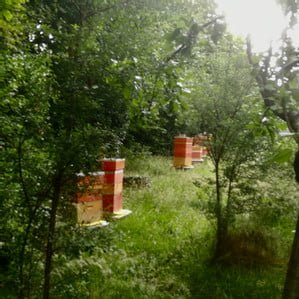A Beekeeper’s Journal: Bees and Blackberries
Joe Shea is the beekeeper at Mourne Grange, a Camphill Community in the Mourne Mountains of County Down.
Here’s his report on the current season:

There’s an old time fiddle tune called Blackberry Blossom and there’s something in its busy run of triplets that describes very well the way the bees forage among these blossoms. A few words in recognition and honour of the blackberry: The blackberry is the bee’s main forage crop of the year in Ireland. From it we derive an essential part of what composes our honey. The appearance of the blackberry blossom marks the high point of our summer; its fading, summer’s decline. Its exquisite yet modest blossoms are impossibly delicate; little fallen stars among the thorny vines. The bees activity, its kinship, with the blackberry blossom is something to ponder. Our observation in this sense is not just looking, but involves us in the experience, relates us to life, cheers the spirit, heals the soul.

At the moment, we have seven colonies of bees, each all right with queens; bar one still waiting on a mating. Rather than cramping them into a minimum of space, I have opted for giving the colonies plenty of room to grow and assume their natural elliptical shape. This means many more boxes and heightened structures. It is less efficient, requiring much more sorting through the boxes, but trouble I reckon well worth taking for the well being of the bees.
June 18th was the first swarm, a full size but late for the season. They went straight into one of the bait hives on top of the bee shed. Next one, on 22 June, was hanging off the blackberries right next to the opening of the apiary. There was another in the orchard the same week, and have been several further sightings of swarms in flight. If anyone sees swarm activity anywhere in the Mourne Mountain community, please call Joe Shea at Mourne Grange.

Elsewise, I have weather proofed the bee shed and the bee storage shed, as well as many bee boxes, with Cuprinol, in preparation for the winter. Cuprinol is recommended as it is scentless, and does not irritate the bees.

The long rainless prelude to summer would mean a lack of nectar in the blossoms. The apples are notably small for this time of year. The blackberry blossom plentiful, but how will the fruit be? All this, and of course much, much more, is tied in with the life of the apiary, our bees. Fair to say, with less nectar available in the blossoms, there will be less honey. Alas all is not the same from year to year; but we live in hope, day by day.
Joe Shea




